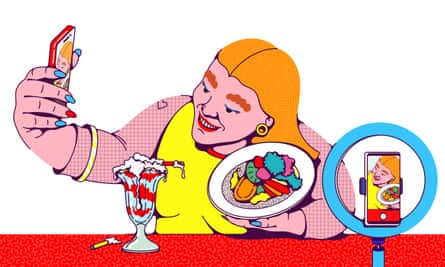
In 2023, every diner is an amateur restaurant critic. From Twitter to TripAdvisor, they are free to air their opinions, with chefs and owners expected to field feedback gracefully, no matter how ill-informed.
Today, we are turning the tables. It is time to talk about how a minority of diners regularly infuriate, irritate and bemuse restaurant staff – not with outrageous acts (although there is plenty of drunken vomiting), but with mysterious foibles, awful manners and low-level thoughtlessness. Is it time for diners to up their game? Here are the behaviours that grate the most.
When eating out, Victor Garvey, the chef-owner at Sola in London, does his due diligence: “I look at the menu, I do my research. I’m not going to bring a vegetarian to a steak restaurant.” Yet, at Sola, “we have people baffled that we serve a tasting menu. You booked this. Not only did you book, but we require credit card details for a not insignificant £169-a-person charge were you to cancel – and you didn’t read the menu, or say you didn’t.
“Imagine showing up at Les Misérables and going: ‘I thought this was Rent, can I have my money back?’ It doesn’t work that way.”
Harneet Baweja, the owner of the Gunpowder restaurants in London, finds it infuriating when people ask for dishes that aren’t on the menu. “Dishes like butter chicken. A guest will say we have the ingredients, why don’t we make it?” he says. “It’s not how the process works; we have to grind spices, marinade meat. It takes hours.”
Wandering diners
Tom Tsappis, the chef at Killiecrankie House in Perthshire, says diners have walked into his open kitchen “more than once, when we’re plating, to take close-up photos. You’ll get in the way. Your food will get cold.” He is similarly baffled by those who, while he is in the middle of delivering a tightly choreographed, £105-a-head tasting menu, “go for a stroll around the garden”.
Rule-bending bookings
Certain diners see a reservation as a loose outline, not a fixed arrangement. “We’ve had tables booked for 7pm turn up at 9pm who can’t understand why we don’t still have the table waiting,” says Meriel Armitage, the founder of Club Mexicana in London.
Others, says Armitage, try to “gamify” the system. If they can’t see a table for 10 on the online booking system, they will book three tables of two and a four, under different names, “instead of calling or emailing, which we’d like, because larger tables require moving existing tables around”. Guests are then mystified that, in a packed dining room, they cannot be seated at adjacent tables or push tables together. “Then they get pissed off.”
Turning up with fewer or more guests than a party has booked for is another common issue. “We had 20 turn up for a table of 16 recently,” says the chef Sam Grainger, who this summer opened Madre in Manchester. Grainger tries to be flexible, but there are limits: “We ended up putting four on the bar, completely separate.”
Also, if booking for six adults and three children, it should be obvious that you need a table for nine, not six. “Kids need seats,” says Grainger. “They’re still people.”
Indoor-outdoor musical chairs
Post-pandemic Britain loves eating outdoors. “Before, it was hardcore smokers; now, it’s everybody,” says Sunny Hodge, who owns Diogenes the Dog and Aspen & Meursault in London. But if you choose to eat in an awning-covered alfresco space, you cannot, if the wind gets up or the sun goes in, expect to move indoors swiftly; that would require restaurants to keep two tables free for every party. Bring a jumper. Check the weather. “You have to be committed,” says Hodge.
Tobacco debris
Cigarettes are expensive; smokers are economising by rolling their own. But tidy up after yourself, pleads James Snowdon, the co-founder of the Palmerston in Edinburgh: “People leave the table covered in plastic from tips, papers, baccy. It does my nut in.”
Phone faux pas
It is rare to hear diners bellowing into their phones these days, but they will show noisy videos to friends and, at the atmospheric, candlelit barge-restaurant Caravel in London, ask for a table with brighter lighting or a different backdrop, to enhance their Instagram photos. “We’ve had people get out light rings or stand on chairs to take overhead pictures of the table,” says the co-owner Fin Spiteri, with a laugh. “What are you doing breaking the atmosphere for everyone? Please sit down.”

Everyday sexism
A small, reactionary rump of diners, says Nicola Tickle, the co-owner and restaurant manager at Heft in Cumbria, treat female waiting staff as if they have “no idea what they’re talking about … they’re constantly looking past you for the nearest man”. It is the thing that winds her up the most. “When you’re 5ft 4in [1.6 metres] and a woman, people just talk through you. The worst bit is that women do it as well. One male waiter is regularly asked if he’s the owner, despite my name being on the menu.” As Tickle puts it, she is not “the owner’s wife”; Heft’s chef, Kevin Tickle, is “the owner’s husband”.
Personal taste is just that …
“Telling us: ‘I don’t think you should use mushrooms,’ because you don’t like mushrooms, is not helpful feedback,” says Tsappis.
Grumbling about the bill
Few diners can be unaware of the soaring costs that have forced restaurants to raise prices this year; if it’s a concern, prices are usually available online before you visit. Yet certain diners insist on complaining to the staff in person. Staff smile through it, but, as Grainger says, “it’s not like we’re all driving around in Rolls-Royces”.
Nonexistent allergies and intolerances
If one thing unites chefs in angry frustration, it is diners who, when booking, flag ingredients they merely dislike as things they cannot eat due to an allergy or intolerance – only to disregard their request when they visit. The classic is the “gluten-free” diner who ploughs into the bread, having decided it is too good to miss.
That occurs “not infrequently”, says James Ramsden, the co-owner at Pidgin in London. “Someone has spent a considerable amount of time doing a special menu for this person – some menus at Pidgin might have gluten in every course – and they’ve decided: ‘Actually, tonight, I’m not gluten-intolerant after all.’”
To diners, this may seem like none of the kitchen’s business. Why would they care? “As a business, it’s our legal responsibility to take allergies very, very seriously,” says Alex Rushmer, the chef-owner at Vanderlyle in Cambridge, who reels off 14 allergens, including peanuts, mustard and celery, covered by legislation. “We assume it’s life-threatening.”
With allergens, the cleaning and plating protocols to avoid cross-contamination are incredibly rigorous. Food intolerances are also taken seriously, Rushmer says: “You don’t want to make someone’s next three days a misery.” Cooking alternative free-from dishes for guests is a lot of extra work. “For the person making us jump through those hoops to be flippant about it,” says Rushmer, leaves chefs “riled”.
Reaching for the salt
“People have this salt trigger-finger,” says Fionnan Flood, the chef at the Chelsea Pig in London. “Assume the chef is going to season food to its highest point. Also, taste before you season, obviously. You’ve no idea how the food tastes.”

Namedropping other restaurants
Doing this to staff – to imply “I know what I’m talking about, I’m some sort of critic” – will not result in special treatment, says Neil Bentinck, the chef at Skosh in York. “It’s pretentious.”
Impatient diners …
“I don’t know how much of it is the modern approach to life in general,” says Richard Bigg, the founder of Camino in London. But from diners walking in and plonking themselves at uncleared tables without acknowledging staff, to others asking heavily laden waiters where dish X or Y is (“well, yes, it’s coming just as soon as I’ve put these plates down”), he would like diners to chill out and have faith: “Just give us a sec.”
If your first contact with a restaurant is an email ranting about their lack of free tables next Saturday night, or a short-tempered voicemail asking why its owners haven’t replied to that email (on their Monday off), they may just hit delete.
… and impatient drinkers
“Turning a wine bottle upside down in the cooler to tell us it’s empty irritates me,” says Bentinck. “If you want another, just ask.”
No-shows
Did the pandemic exacerbate the no-show? One theory is that, when tier restrictions made booking essential, larger numbers of people started booking multiple restaurants to let them choose one at the last minute – and have continued to do so, despite widespread media coverage about how financially damaging no-shows are.
“We’ve definitely found the habit worse post-Covid,” says Hubert Beatson-Hird, the co-founder of Lunar Pub Company in London. Taking card details for online bookings, to impose a £20-a-person no-show charge, “has been effective at stopping it”, but not every venue can do this. Some smaller, casual, neighbourhood places find it counterproductive – a potential vibe-killer and difficult to manage.
“Venues organise food and staffing for a set number. When people don’t turn up, it can have a huge effect,” says Beatson-Hird. “If you book, please turn up or cancel.”
Misplaced manners
Taking drinks from a waiter’s tray may unbalance it and send glasses flying. “It’s well-intended, but not helpful,” says Bigg.
Bottle-grabbers and cork-sniffers
There are some wine drinkers (wealthy, haughty, “delusions of grandeur”), whom Glen Montgomery, the co-owner and sommelier at Eòrna in Edinburgh, approaches cautiously. This is mainly because they are given to grabbing and inspecting the aged bottles with which he presents them: “They mix the sediment up like a snow globe, then send me back to the cellar for a properly rested bottle.”
A performance will then ensue, where said guest “holds the cork to their nose ceremoniously, sniffs, looks contemplative and perhaps gives a sombre nod to indicate their wine mastery to their party and the lowly sommelier”.
There are technical reasons to inspect an aged wine’s cork, but these are “more visual than aromatic”, says Montgomery; it tells you far less about the wine than the sample in your glass.
Pushing your luck with sharing plates
Not every sharing dish divides neatly between the number of diners at the table. You can’t start ordering bespoke portions, or haggling for extra food, to solve that.
Direct-message diners
At Club Mexicana, a growing number of diners use Instagram messages to communicate with the restaurant. They do this not only to enquire about table availability or menu details – which are best addressed via the online booking system, phone or email – but even to ask real-time questions (“how long will my burrito be?”) while sitting in the restaurant, surrounded by serving staff.
“It’s like they’re more comfortable having a conversation digitally than with an actual person,” says Armitage. This is something most restaurants are not designed to handle – particularly given the industry’s protracted staffing crisis. “Sometimes, we’ll see something pop up [on social media] and ask the waiter: ‘Can you go and see table 3?’ Which is ridiculous.”
Wine wary? Speak up!
Montgomery understands people are sometimes nervous around sommeliers. Wine can be a “stupid, pretentious” world and diners worry about sounding silly. But keeping stumm, asking a sommelier to choose your wine without offering any clue about what you like (a grape, a country, flavours), is obviously suboptimal.
Be direct about budget, too. “I love that. Tell me you’ve got 50 quid and I’m going to give you something better for £40. That’s the real challenge.”

